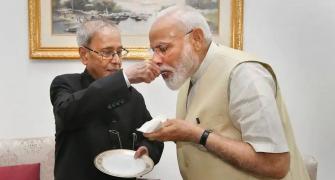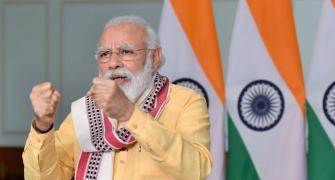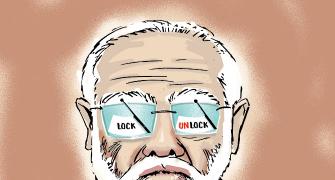'What matters is meeting the needs and expectations of the people who have voted to provide governance for the country.'

There are few people in the Indian bureaucracy who can claim to have a record as lengthy as Nand Kishore Singh.
Singh, currently the chairman of 15th Finance Commission, has served in the prime minister's office and the finance ministry under different prime ministers.
He was sent to the Rajya Sabha by the Janata Dal-United and completed his term from 2008 to 2014 before joining the Bharatiya Janata Party that year.
It is this momentous five-decade journey that Singh chronicles in his latest book Portraits of Power: Half a Century of Being at Ringside.
The book is equally good as a history of contemporary India -- mostly its political economy -- as it is his autobiography.
N K Singh, below, spoke to Rediff.com's Utkarsh Mishra about his new book.
"What matters is meeting the needs and expectations of the people who have voted to provide governance for the country," says Singh.
You begin your book by saying that notable bureaucrats, including your father, did not write any autobiographical account. You also mention the thoughts that drove you to write one.
In a country like India, where crucial decision-making process remains protected by the Official Secrets Act etc, how difficult it is for a bureaucrat to pen a memoir and how does one choose which facts to tell and which to hide?
This is always a daunting challenge. One must combine truth with discretion.
Crystal gazing, as they say, can lead to multiple conclusions.
Equally, different facets of the same event can be described without necessarily violating the Official Secrets Act or detracting from its truthful account, too.
Incidentally, autobiographies are usually written at the end of one's public career and, to some extent, the dilemma faced by serving civil servants is much sharper than if you have retired into history.
This, in no way, should discourage civil servants who have been engaged in shaping public policy from penning down their thoughts, their experiences, their challenges, both success and failure.
On a similar note, what about accounts of insiders that have been detrimental to the personal reputation of leaders?
For example, many believe that M O Mathai's books damaged Jawaharlal Nehru's image posthumously.
Similarly, Dr Manmohan Singh was apparently unhappy with what Sanjaya Baru wrote.
How does one maintain a balance without being untruthful?
 This is important but, again, the description of circumstances and events can be written without hurting the prospects of the dramatis personae.
This is important but, again, the description of circumstances and events can be written without hurting the prospects of the dramatis personae.
I have also mentioned that in writing any autobiography, one has multiple choices.
The one choice is to describe the incidents and personalities with nakedness and raw details, which could sometimes be offending.
The other side is to look at the better side of human nature and to appreciate the constraints under which those policy decisions were really taken.
Balancing these two is what readable autobiographies are all about.
ou have given a detailed picture of the shifting of power balance between the prime minister's office and the Cabinet secretariat over the years. If I'm not wrong, you prefer a stronger PMO.
But doesn't that contradict the 'first among equals' definition of the PM, leaving the Cabinet almost redundant?
The dynamics between the PMO and the Cabinet Office is in a constant state of flux.
The Cabinet Office, whose emergence I have described, has a principal obligation under the Constitution to ensure the compliance to rules, regulations and sanctity of procedures.
However, the principal duty of the Cabinet Secretary is to be the secretary to the Council of Ministers, which is what he was from its very inception.
The principal duty of the PMO is to assist the PM in the discharge of his official functions.
Indeed, the critical change affected on July 17, 1967, was to create a department, which had an entry under the Allocation of Business Rules.
There are times when the PMO relegates itself to the background. Particularly, when governments are in transit or in flux or there is uncertainty on the leadership.
On the other hand, in a stable government, the PMO is enjoined to carry out the initiatives and the programmes of the PM as sincerely as possible.
You also say that 'if the Westminster model is on the wane, then so be it' and suggest that it is always a strong, dominant leader who can push reforms. Is this personality cult good for a country like India?
Personality cult has a pejorative connotation.
It is true all over the world that elections are being increasingly won or lost depending on the credibility of the top leader. The President or the PM as the case might be.
How many of us remember who the current PM in the United Kingdom or his predecessor wanted to have as the home secretary or the chancellor of the exchequer?
What mattered was who was the likely choice to be the PM in case that party came to power.
This pattern is being replicated because what is important is meeting the expectations and the aspirations of the people.
In the end, institutional structures are being made to meet the aspirations of the electorate. They are not created over fine distinctions between a strong or weak PMO.
What matters is meeting the needs and expectations of the people who have voted to provide governance for the country.
A strong, decisive leadership, which can guarantee both security of life and property, implement the Constitution and bring about a faster rate of economic growth, is what countries like India need.
You have suggested some major parliamentary reforms in the book, among which is empowering the select committees.
Against this backdrop, how do you see the fact that major bills have been pushed through Parliament recently without being sent to select committees or without allowing a discussion with stakeholders?
The practice of enacting major legislations without the scrutiny of the select committee is, in the long run, fraught with infirmities.
At the end, whether the bill is passed directly by the House or sent to the select committee or not is a decision of Parliament itself.
Parliament decides that the bill is important or urgent enough to be enacted without the benefit of the select committee; it can choose to do so.
However, in general, for non-urgent legislation, the practice of the wisdom of a more detailed scrutiny through a select committee is the more desirable one since it also enabled great interaction with stakeholders.
Besides, parliamentary standing committees, as they are called, comprise both Houses of Parliament and has the great advantage of checks and balances.
It also has the advantage of calling outside experts to depose before the standing committee, enabling them to have the benefit of the views of multiple stakeholders.
Many experts often criticise the nature of Indian bureaucracy where very less premium is put on subject expertise. Today's tourism secretary can be tomorrow's finance secretary.
Do you think this needs to change, and subject experts should be preferred for such crucial roles?
This is always a tricky question; balancing domain knowledge with multiplicity of experience.
In the end, officers from the civil service are selected with multiple skills, not merely domain knowledge but more importantly, their managerial and management talents.
Managing a flood, a relief work, an earthquake, a cyclone, education policies or macroeconomic frameworks are all to be performed by the selected functionaries.
The civil service has an important expression: He may be a bright chap, but can he deliver? Deliver means, does he have the managerial skills and talent to implement the policy under consideration?
That is why I have argued that in the higher echelons of the civil service, no doubt, dominant skills need to be fortified and their experience gathered earlier should be put to public use.
On quite a few occasions, this is followed what may be called grooming for a particular set of assignments.
At other times, this is not so but combining domain knowledge with managerial talent is not necessarily asymmetrical and certainly by no means contradictory.
I have also argued that people with domain knowledge must not give up reading and, more importantly, keeping themselves abreast of the changes in the area where their speciality lies.









